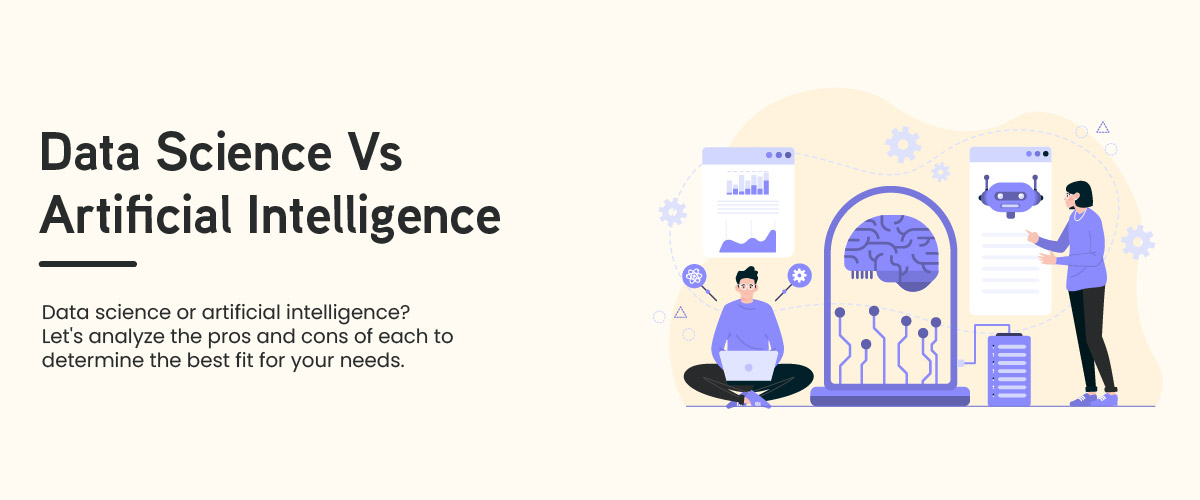Data Science and Artificial Intelligence: Differences & Similarities
The relationship between data science and artificial intelligence can be traced back to the mid-twentieth century. While data science is concerned with extracting insights and knowledge from data, artificial intelligence is concerned with creating intelligent computers capable of performing tasks that need human-like intelligence. In this blog, we will discuss the major differences between data science and artificial intelligence while also considering some of their similarities.
What is Data Science?
Data science is an interdisciplinary field that includes extracting insights and knowledge from data using statistical and computational approaches. It combines statistical, computer science, and domain expertise techniques to find patterns and insights in massive datasets.
Data science can be applied in a wide range of industries and applications, including healthcare, finance, and marketing. Check out these data science applications.
What is Artificial Intelligence?
Artificial intelligence (AI) is a branch of computer science and engineering concerned with developing intelligent machines that are capable of simulating human intelligence and behavior. The goal of artificial intelligence is to create algorithms and models that can perform activities that generally require human-like intellect, such as visual perception, speech recognition, decision-making, and language translation.
AI is built on the concept of creating machines that can learn from data and improve over time. The foundational components of AI include technologies for speech recognition and translation.
Differences between Data Science and Artificial Intelligence
The following are the major differences between data science and artificial intelligence.
| Parameters | Data Science | Artificial Intelligence |
| Definition | The process of using data to gain insights and knowledge. | A branch of computer science that focuses on creating intelligent machines that can simulate human intelligence and behavior. |
| Focus | Focused on extracting insights and knowledge from data. | Focused on creating intelligent machines and algorithms that can perform human-like tasks. |
| Techniques | Statistics, machine learning, data visualization, and data mining. | Machine learning, deep learning, natural language processing, computer vision, and robotics. |
| Applications | Business analytics, predictive modeling, data mining, and data visualization. | Virtual assistants, self-driving cars, fraud detection, medical diagnosis, personalized marketing, and predictive maintenance. |
| Objective | To extract insights and knowledge from data to solve business problems. | To create intelligent machines and algorithms that can perform tasks that require human-like intelligence. |
| Data Sources | Structured and unstructured data from various sources, such as databases, social media, and sensors. | Structured and unstructured data from various sources, such as images, audio, and text. |
| Outcome | Insights and knowledge gained from data that can be used to improve business decisions. | Intelligent machines and algorithms that can perform tasks that would typically require human-like intelligence. |
Data Scientist vs. Artificial Intelligence: Skills
The abilities required by data scientists and AI professionals are comparable, yet they bear some significant variations. While both data science and AI necessitate programming and data analysis skills, AI practitioners must also be proficient in machine learning, deep learning, NLP, computer vision, and robotics.
If you’re planning to start a career in data science, check out this data science course with placement and get assured assistance in the interview process. As such, the following skills are required to become a data scientist:
- Statistics: To interpret and analyze data, data scientists must have a solid understanding of statistics.
- Programming: To work with huge data sets and create statistical models, data scientists must be fluent in programming languages, such as Python or R.
- Data Wrangling: The ability to clean, transform, and prepare data is required by data scientists for analysis.
- Data Visualization: Data scientists must be able to effectively explain their findings through data visualization.
- Domain Knowledge: To ask the proper questions and develop relevant insights, data scientists must have domain expertise in the field in which they operate.
The following skills are required to become an artificial intelligence professional:
- Machine Learning: To construct intelligent systems, AI practitioners must have a solid knowledge of machine learning algorithms and methodologies.
- Deep Learning: Deep learning is a subfield of machine learning that involves the construction and training of neural networks. To construct advanced AI systems, AI practitioners must have a thorough understanding of deep learning techniques.
- Natural Language Processing (NLP): To construct systems that can interpret and synthesize human language, AI practitioners must be knowledgeable in NLP approaches.
- Computer Vision: AI practitioners must be skilled in computer vision techniques in order to create systems that can analyze visual data, such as photographs and videos.
- Robotics: To develop and program robots that can execute physical tasks, AI practitioners must have a strong understanding of robotics.
Applications of Data Science
Data science is applied in various fields and has applications in fraud detection, transport, gaming, banking, etc. Here is an example of a few data science applications:
- Finance – Data science is used in finance to detect patterns and trends in financial data, such as stock prices and market trends. This data can be used to make sound investment decisions or create new financial products.
- Healthcare – Data scientists in healthcare can examine a comprehensive collection of medical records to uncover trends and risk factors for certain diseases. This data can also be utilized to create tailored preventative and treatment plans.
- Marketing – Data science is used in marketing to study client behavior and preferences. This data can be utilized to develop more focused advertising campaigns, customize product suggestions, and boost consumer happiness.


What are the Similarities in AI and Data Science?
Let us discuss some of the similarities between AI and data science:
- Dependence on Data: Both fields rely on data for outcomes. Data is essential in data science to obtain insights for decision-making while artificial intelligence uses data to train models.
- Problem-solving: Both domains aim to provide solutions for complex problems with technology. While data science is focused on data-driven decision-making, AI is focused on simplifying tasks through automation.
- Machine Learning: AI and data science use machine learning. The former utilizes ML technology for training machines, while the latter uses machine learning to analyze data and make predictions.
- Interdisciplinary Fields: Both AI and data science are interconnected with various disciplines like computer science, mathematics, engineering, robotics, etc.
Is AI Dependent on Data Science?
AI is heavily reliant on data science since data science serves as the foundation for developing intelligent systems that can learn from data and make predictions. Data science also provides the tools and techniques necessary to gather, preprocess, and analyze data for use in training and improving AI models. Following are some instances of how data science is used in AI:
- Image Recognition: AI-powered image recognition systems can recognize and classify items in photos with high accuracy. The accuracy of these systems, however, is strongly dependent on the quality and quantity of data utilized to train them. Image data is collected, preprocessed, and labeled using data science to train these algorithms.
- Natural Language Processing (NLP): NLP is a branch of artificial intelligence that studies how machines comprehend and process human language. Large volumes of text data are used to build NLP models, which are preprocessed using data science techniques, such as tokenization, stemming, and part-of-speech tagging.
- Recommendation Systems: It utilizes machine learning algorithms to offer items, services, or content based on a user’s previous behavior. Large volumes of data on user preferences and behavior are required for these systems, which are evaluated and modeled using data science approaches.
- Fraud Detection: AI-powered fraud detection systems can automatically detect fraudulent activities in financial transactions. These systems are trained on large amounts of data on past fraudulent transactions, which is analyzed and modeled using data science techniques, such as anomaly detection and pattern recognition.
Conclusion
AI and data science are both extremely promising areas with several career options. Data scientists have been in high demand in recent years, and this trend is projected to continue. AI, on the other hand, has the potential to change a variety of industries, including manufacturing, transportation, and healthcare, by developing intelligent systems capable of automating repetitive processes, making predictions, and improving efficiency. Both sectors provide good chances for progress and growth, as well as competitive compensation and benefits.
Are you looking forward to working in any of these domains? Share your preferred field for career prospects in the comments section below. Further, grab a chance to make a great impression on the recruiter by enhancing your portfolio with top artificial intelligence projects and popular data science projects.







